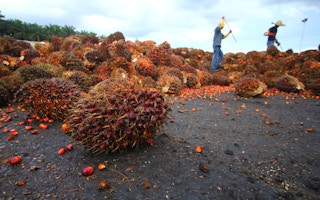The aftermath of Singapore’s worst environmental crisis in a decade, with the island being enveloped by haze from Indonesian forest fires last year, seems to have smouldered out – at least, the diplomatic side of it.
To continue reading, subscribe to Eco‑Business.
There's something for everyone. We offer a range of subscription plans.
- Access our stories and receive our Insights Weekly newsletter with the free EB Member plan.
- Unlock unlimited access to our content and archive with EB Circle.
- Publish your content with EB Premium.
The slanging match between the Indonesian and Singaporean Governments has ended. Singapore has issued a law which seeks to impose criminal and civil liability on companies responsible for haze pollution, even when they are not located in Singapore; and Indonesia last month signed up to an ASEAN agreement on trans-border haze pollution, which requires Indonesia to take steps to prevent smoke from its fires wafting into its neighbours’ yards.
On September 4 last year, we reported on this website that amidst the inferno, the Indonesian Government was planning to crack down on plantation “monopolies” by limiting crude palm oil (CPO) plantation holdings of a “group of companies” to 100,000 hectares. Many of these are controlled by foreign interests.
The threat became a reality later that month. The 100,000-hectare “group” limitation now applies across Indonesia, except for Papua and West Papua provinces, where groups are permitted double this size. A heavily criticised exemption to the 100,000-hectare limitation for listed companies, which are regarded by some as the worst offenders, survived into the final regulation. However, a plan to further restrict group holdings to 20,000 hectares per province was ultimately abandoned.
While there is no requirement to dispose of existing plantation land where a group already holds more than 100,000 hectares, this change is an attempt to stop the big groups from becoming even bigger.
In some parts of Indonesia, the CPO plantation industry is concentrated in the hands of powerful conglomerates and families. This industry had been thought immune from the resource nationalism faced by the mining industry, which has been subject to measures ranging from a 49 per cent foreign investor limitation on production mines and a requirement to process raw ore onshore, to a domestic market obligation for coal and increasing export taxes.
Now, companies need to think again.
In July 2014, a draft new plantations law started circulating, proposing that:
- foreign interests in Indonesian plantations would be limited to 30 per cent; and
- existing foreign shareholders would be required to reduce their shareholdings in plantation companies to 30 per cent within five years.
The draft was heavily criticised for being retroactive (that is, applying to events that happened before the law was issued), which is both contrary to Indonesia’s Constitution and vulnerable to action against the Indonesian Government under various bilateral investment treaties. Outgoing President Susilo Bambang Yudhoyono publicly stated that he was not in support of the 30 per cent limitation. Industry groups said the 30 per cent limitation would kill much-needed foreign investment in the plantation industry. Foreigners were more likely to switch from Indonesia to other countries with more open investment rules, including the Philippines and Malaysia.
The outgoing Indonesian parliament rushed through the new law on plantations in late September 2014. While the new law abandons the concept of the 30 per cent foreign shareholder limitation, the issue is far from resolved, having merely been postponed.
The new plantations law does not set specific foreign shareholder limitations. Rather, it provides that these limitations will be set out in regulations to be issued within two years of its enactment. In other words, the law allows the debate to continue, creating uncertainty for foreign investors.
The new law states that one of its purposes is to fix limitations on foreign investment in Indonesian plantations, which must be based on the “national” interest. The national interest will be determined by taking into account the type of plants, the scale of the plantation business, and conditions specific to the location of the plantation.
“
So Indonesia now appears to be beginning to take its environmental obligations very seriously. While foreign investors almost invariably consider their environmental obligations, they may now need to place more focus on them.
Plantation companies now face a similar situation to that faced by mining companies after the 2009 mining law, which said that foreign shareholder sell-off requirements would be set in further regulations. In 2010, a divestment of 20 per cent at the sixth year of commercial production was initially set for mining companies. That was later changed to a phased divestment of up to 51 per cent from the sixth year to the tenth year of commercial production, and ultimately to a 49 per cent foreign shareholder limitation for most Indonesian production mines. As a result, after early investment during the exploration phase, a foreign shareholder then loses its right to retain control during the production phase .
It is not yet clear whether the scenario for Indonesian plantations will follow the same path.
The good news for foreign investors is that while the debate has been postponed, and no matter what the foreign shareholder limitation may ultimately be set at, the law implies that the five-year sell-down concept has been abandoned, and that a sell-down will not be required of existing foreign investors until their plantation titles expire. Most CPO plantation titles are valid for 35 years.
However, the regulations contemplated by the new law could regulate differently on the grace period before foreign investors have to sell down their stakes.
Meanwhile, CPO is not the only commodity under scrutiny. Although President-elect Joko Widodo, who was inaugurated on October 20, is reportedly committed to “friendlier” foreign investment, the resource nationalism policy may continue. Mr Widodo has confirmed that the raw ore export ban is here to stay, and has indicated also that other items such as coffee, wood and seaweed should be subject to a similar ban. This ban may expand to cover other commodities as well.
The new plantations law carries over a provision from the old law that prohibits the burning of forest areas to make way for plantations. However, plantation companies are now required to have systems and equipment in place to control any fires that break out.
To date, environmental cases in Indonesia have been fairly rare, with heavy sanctions unlikely to be invoked. However, that now seems to be changing.
From June to August 2014, the Indonesian Government conducted an audit of 17 companies in the Riau Islands on their level of compliance with environmental regulations. All 17 reportedly failed.
A court in Riau recently jailed the manager of a Malaysian subsidiary for negligence in causing fires, and ordered the company to pay US$1.5 million to rectify environmental damage. And two managers of an Indonesian public company are currently on trial, facing up to 20 years in prison.
So Indonesia now appears to be beginning to take its environmental obligations very seriously. While foreign investors almost invariably consider their environmental obligations, they may now need to place more focus on them.
Rick Beckmann is a partner at Norton Rose Fulbright Australia who works at the Indonesian associate office of Susandarini & Partners. Aldi Rakhmatillah is an associate at Susandarini & Partners with substantial experience in assisting foreign and Indonesian clients in respect of plantation acquisitions and operations.


















